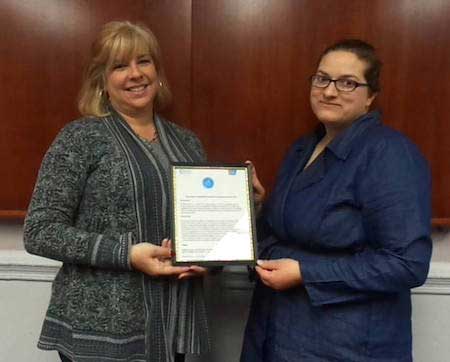Orleans Community Health will increase colorectal screenings

Provided photo: Wendy Jacobson (left), CEO and president of Orleans Community Health, and Joanna Miller, administrator of the OCH healthcare site in Albion, are pictured with a pledge to increase colorectal screenings in Orleans County.
Press Release, Orleans Community Health
Orleans Community Health is joining forces with over 500 local and national organizations to increase colorectal cancer screenings rates across the country.
The “80% by 2018” is a shared goal to have 80 percent of adults aged 50 and older regularly screened for colorectal cancer by 2018.
Colorectal cancer screening has been proven to save lives. Orleans Community Health today announced that it has made the pledge to help increase colorectal cancer screening rates by supporting the 80% by 2018 initiative, led by the American Cancer Society (ACS), the Centers for Disease Control and Prevention (CDC) and the National Colorectal Cancer Roundtable (an organization co-founded by ACS and CDC).
Colorectal cancer is the nation’s second-leading cause of cancer-related deaths. However, it is one of only a few cancers that can be prevented. Through proper colorectal cancer screening, doctors can find and remove hidden growths (called “polyps”) in the colon, before they become cancerous. Removing polyps can prevent cancer altogether.
“80% by 2018” is a National Colorectal Cancer Roundtable (NCCRT) initiative in which over 500 organizations have committed to substantially reducing colorectal cancer as a major public health problem and are working toward the shared goal of 80% of adults aged 50 and older being regularly screened for colorectal cancer by 2018.
“Colorectal cancer is a major public health problem, and adults age 50 and older should be regularly screened for it, but we have found that many people aren’t getting tested because they don’t believe they are at risk, don’t understand that there are testing options or don’t think they can afford it,” said Dr. Mary Rykert-Wolf of the Albion Health Center. “The truth is that the vast majority of cases of colorectal cancer occur in people age 50 and older. Colorectal cancer in its early stages usually has no symptoms, so everyone 50 and older should get tested.”
There are several screening options – even take home options – available. Plus, many public and private insurance plans cover colorectal cancer screening and there may be local resources available to help those that are uninsured.
“Getting screened is much easier and more affordable than getting treated,” Rykert-Wolf said. “Only 25% of those diagnosed with colon cancer have a family history, the rest just appear. An ounce of prevention is worth a pound of cure.”
While colorectal cancer incidence rates have dropped 30 percent in the U.S. over the last 10 years among adults 50 and older, it is still the second leading cause of cancer death in the U.S, despite being highly preventable, detectable and treatable. In fact, in 2015 in the U.S., 132,700 cases of colorectal cancer were diagnosed.
Part of the 80% by 2018 goal is to leverage the energy of multiple and diverse partners to empower communities, patients, providers to increase screening rates. The 80% by 2018 initiative consists of health care providers, health systems, communities, businesses, community health centers, government, non-profit organizations and patient advocacy groups who are committed to getting more people screened for colorectal cancer to prevent more cancers and save lives.
“We are thrilled to join the cause to improve colorectal cancer screening rates,” said Wendy Jacobson, CEO/Orleans Community Health. “We are asking all members of our community to come together and help us by getting screened and talking to your friends and family who are over 50 years of age about getting screened. Together, we can help to eliminate colorectal cancer as a major public health problem.”
For more information or to learn about resources in your area, visit: www.orleanscommunityhealth.org or call the Cancer Services Program of Genesee and Orleans Counties at 585-344-5497.





































































